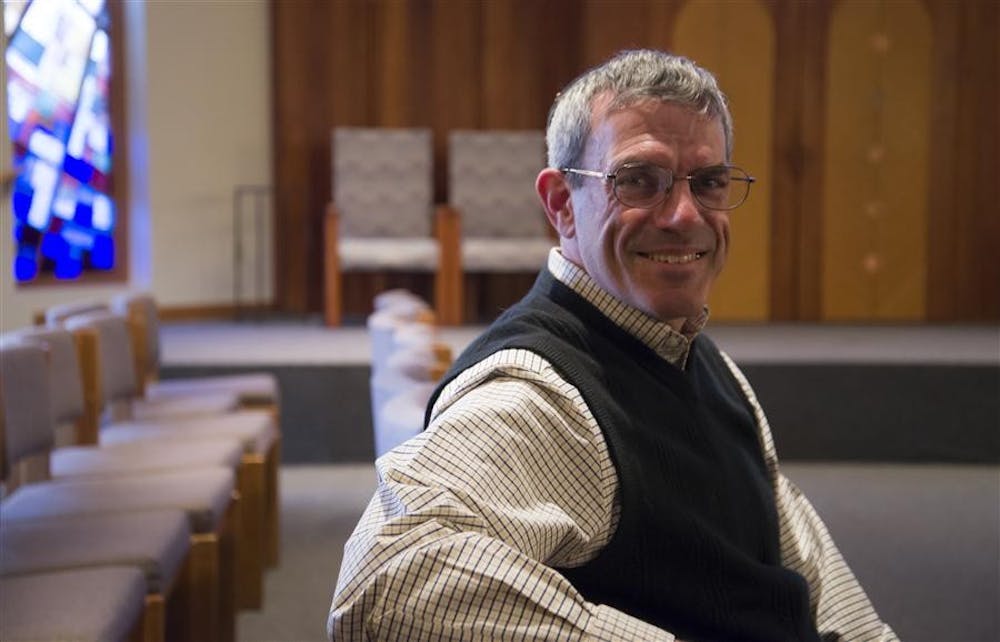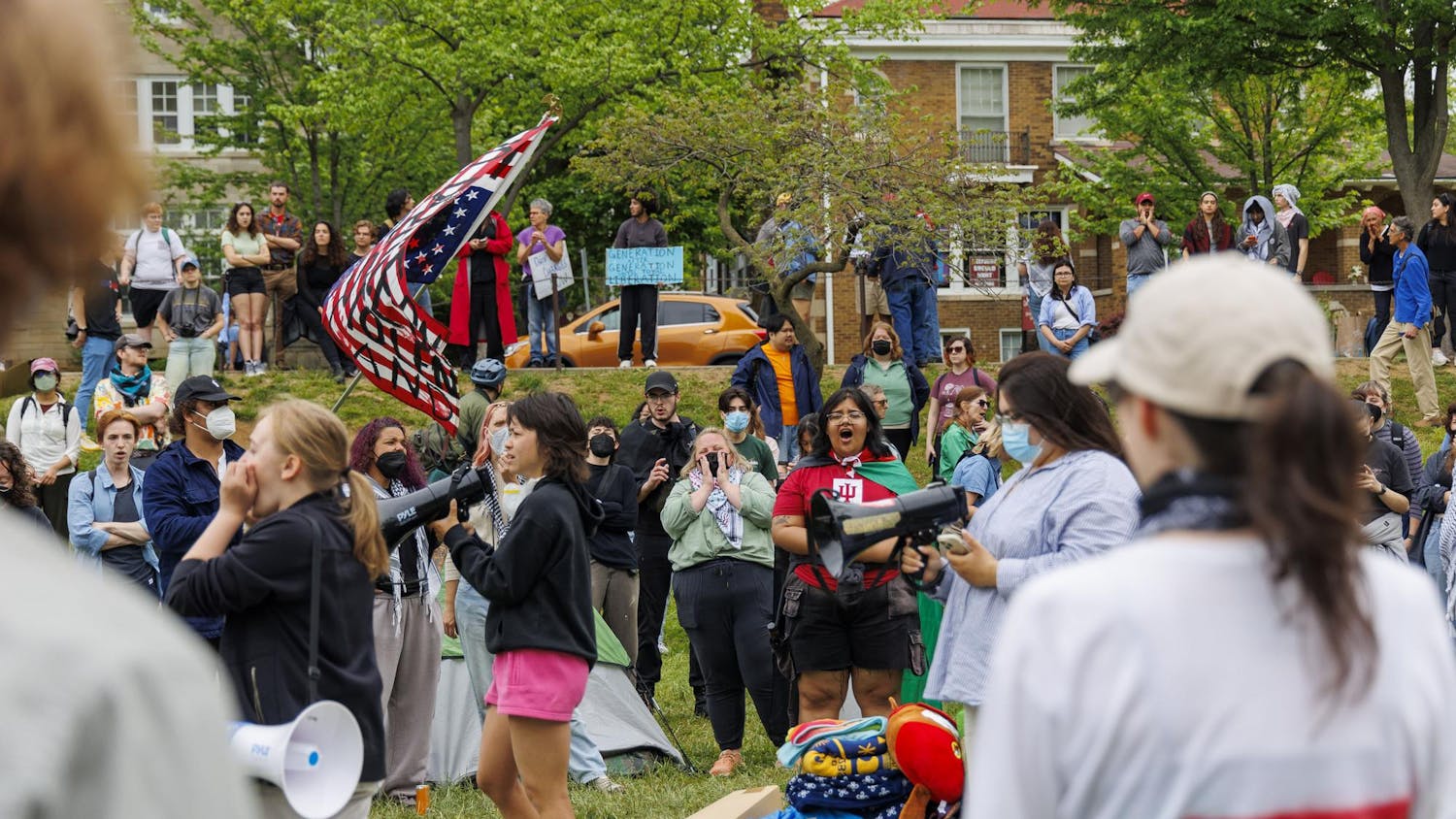A silver chain with a cross pendant hangs from the wall. On the neighboring bookshelf, there is a pride flag. It’s just a small sticker stuck on the edge of a shelf, but the proud hues of red, orange, yellow, green, blue and purple are far from muted.
Faith and tolerance have equal representation inside Rev. Caela Wood’s office. She is a minister at the First United Church — a church in Bloomington that supports the LGBT community.
“There are a lot of Christians who see no issue with it, who believe that God loves everybody and that God just happened to make some people love people of the same gender, and it’s not a big deal,” Wood said. “But it’s unfortunate, because that’s not as glamorous as me holding up a sign that says ‘God hates fags.’”
Unity of Bloomington is another Christian church in Bloomington that supports the LGBT community.
“Other denominations start more in a place of humans being flawed. You hear the term ‘sinner.’ You hear the term ‘broken,’ but we don’t start there,” Rev. Lauri Boyd said. “We start from the assumption that everyone begins at their core as an expression of God, which means we are whole, perfect and complete.”
***
Rabbi Brian Besser of the Congregation Beth Shalom has been with his partner for 15 years.
“My affirmation of same-sex marriage is a religious position,” he said. “My belief in same-sex marriage is grounded in my religious beliefs. It’s not a secular position. I think just me leading the congregation makes a very strong statement.”
Wood, Boyd and Besser all agreed that clergy members recognize the conflict many people face between their faith and acceptance of LGBT people.
“There are a lot more Christians who feel really conflicted, because they know gay people in their life, who they love, but they go to a church where their pastor never talks about it or has a pastor that says, ‘you know, love the sinner, hate the sin,’” Wood said. “So, I think there are a lot of people that really struggle and are really conflicted with what they feel and what their faith is telling them.”
Acceptance can be even more challenging for those who are gay, lesbian, bisexual or transgender, Boyd said.
“I was planning to become a rabbi when I was a teenager, and then I was conflicted with my sexual orientation and fell away from Judaism for a period of 10 or 20 years,” Besser said. “I rejected religion and felt like it didn’t have a place for me.”
Wood echoed similar concerns. pointing out the fear of rejection from religion for
homosexuals.
“What a lot of people don’t realize is that if you are a gay person, it’s probably pretty terrifying to go to church,” Wood said. “Especially if you are trying to go to church with your partner, you don’t know if you are going to sit down and hear a sermon that says you are going to hell, or if people are going to look at you funny or tell you to leave.”
Wood said a lot of people don’t realize that Christianity is hugely diverse, which is why some gay people are in disbelief when they come to First United.
“There are some expressions of faith that are much more literal-minded, that are much more black and white, and that is where they find their strength,” Boyd said. “There are other expressions of faith that see much more shades of gray — not even shades of gray, but diversity — and that’s where they find their strength.”
Neither First United Church nor Unity of Bloomington considers the Bible as the literal word of God, which some Christian denominations believe.
“We believe it was created by people who were deeply involved in their spiritual path and in trying understand the great, ultimate questions,” Boyd said. “They also lived in a particular place, in a particular culture, and they were influenced by that.“
Wood, too, said she felt that while the Bible is core to her faith, it is not the literal word of God.
“To me, the Bible is the story of how people experience God,” Wood said. “Just because I don’t take it literally or don’t believe God wrote it doesn’t mean it isn’t core to my faith and who I am.”
Besser accepts other interpretations of the Bible, but said he questions people imposing their point of view.
“While I accept that different people can interpret the Bible in different ways, but if you deny same-sex equality because of your interpretation of scripture, then you’re imposing your religious values on everyone else,” Besser said. “And that’s a violation of the First Amendment. We’re supposed to have a separation of church and state.”
Wood, Boyd and Besser were all part of the clergy who were present and in support of the LGBT wedding ceremonies that occurred during Pride weekend.
Wood said she asked Danielle McClelland, coordinator of the Pride LGBTQ Film Festival, if clergy could participate, since religion can be a reason LGBT people are discriminated against.
“When a gay person is driving down the street and see my church, they more than likely see this as a place of oppression, as an instrument of taking away their rights,” Wood said.
While their voices may not be as recognizable as those of the Westboro Baptist Church, Wood said it was important they voice their acceptance.
“I believe it’s our duty as Christians who don’t believe in discriminating against queer people. It’s our duty to be out there saying, ‘Look, there are Christians who are on your side, who believe God loves you as much as anyone else,’” Wood said.
Wood, Boyd and Besser all said preaching acceptance and tolerance is the most important message for their community to hear.
“Now as a rabbi, I have a lot of sensitivity and empathy for people who are struggling,” Besser said. “Now, it’s my job to show that religion, and even scripture, has a place for everyone, to open up religion and to open up scripture to help people find a home there, the way I have.”
Clergy members recognize disparity

Get stories like this in your inbox
Subscribe





